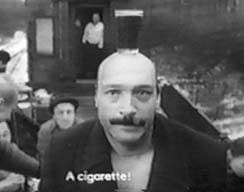

The film is set in Moscow in February 1953, the month preceding Stalin's death. The so-called "Doctor's Plot," an anti-Semitic campaign triggered by Stalin's secret police, constitutes the historical background of the film. Iurii Klenskii, the chief brain surgeon in a Moscow hospital and a Red Army general, gets arrested as one of the prime suspects in the "Doctors' Plot": secret police incriminate him with the conspiracy against Soviet top leadership. Tortured and raped, Klenskii is eventually released to provide his medical expertise to a dying Stalin, whose death he eventually witnesses.
Khrustalev, My Car is a meta-film about Soviet cinema, a nightmarish monument to the exhausted tradition that since its avant-garde beginnings favored dark ambiguities of carnival attractions. The impulse of escape propels the motion on the screen while infantile perspective determines the film's narrative stance. The exodus of viewers during of a screening in Cannes in 1998 aptly demonstrates the picture's visual aggression—just as the film's characters are accosted, so is the audience. Eisenstein could only dream of such a successful outcome for his bold avant-garde projects. As Russian critic Elena Stishova noted, the story, told from a young boy's perspective, portrays a "phantom reality"—this is Cinema Inferno, an antipode of Giuseppe Tornatore's famous picture.
"Khrustalev, My Car! resembles nothing else in cinema—although if Fellini, Tarkovskii and Tati had pooled resources to update a Gogol story, they might have matched it …. German's film … may be Russian cinema's answer to Finnegans Wake"—Jonathan Romney, Guardian
"Years in the making, this alarming phantasmagoria is one of the great films of the decade: brilliantly directed, unrelentingly grotesque, savagely bleak"
—J. Hoberman, Village Voice

Born in 1938, Aleksei German is the son of the acclaimed Soviet author Iurii German. He studied at the Alexander Ostrovski Institute of Dramatic Art in Leningrad and, in 1964, began working at Lenfilm, first as an assistant director and then as a director. For Khrustalev, My Car! German won several Nika awards including Best Director and Best Film in 2000, as well as the Russian Guild of Film Critics award in 1999 for Best Director.
| 1967 | The Seventh Companion (with Grigorii Aronov) |
| 1971 | The Verification / Operation New Year |
| 1976 | 20 Days Without War |
| 1982 | My Friend Ivan Lapshin |
| 1998 | Khrustalev, My Car! |